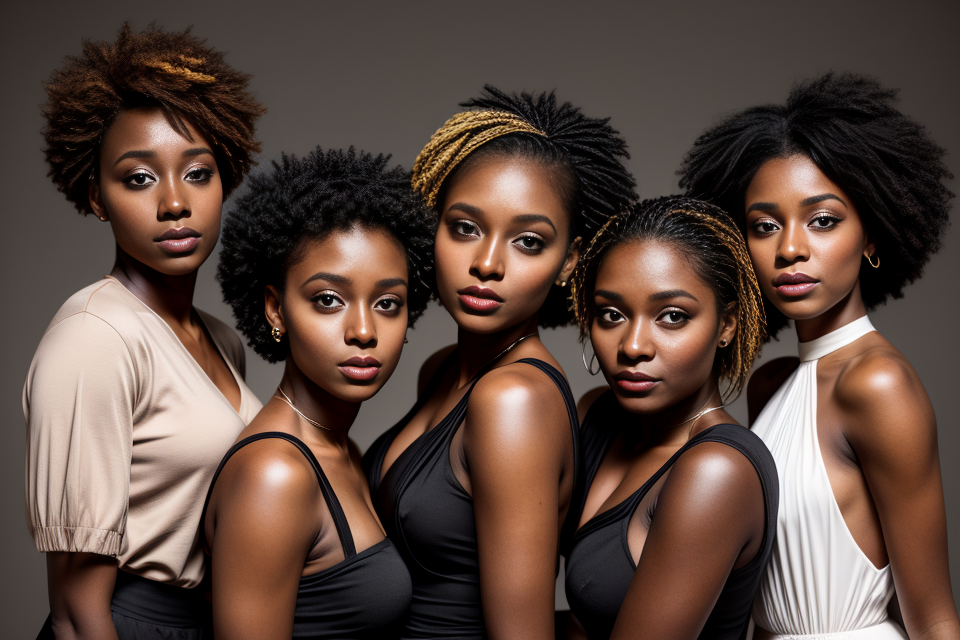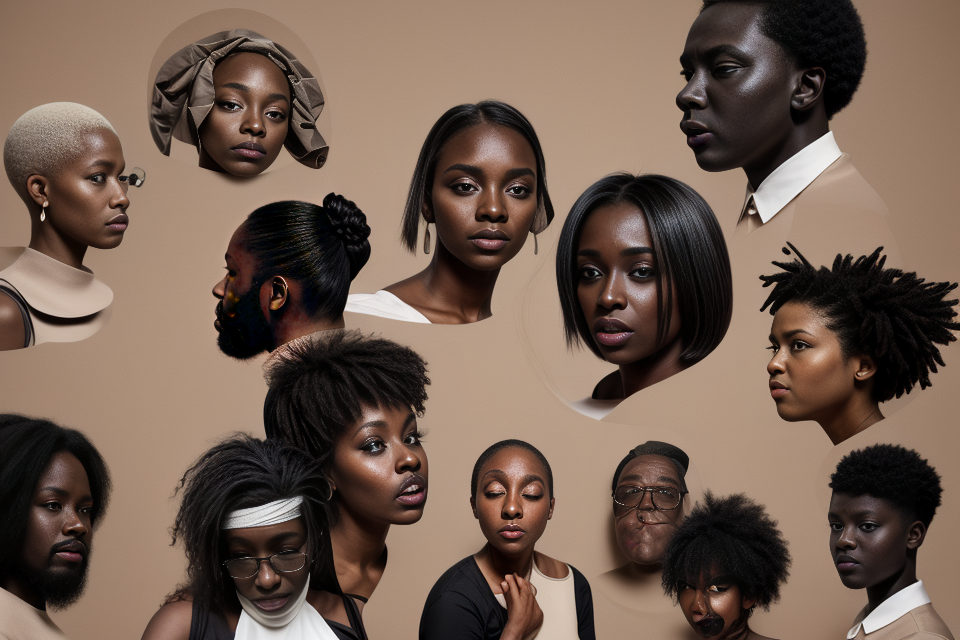When it comes to skin color, there are many misconceptions and stereotypes that exist in society. Dark skin has often been viewed as a disadvantage, with people associating it with negative characteristics such as ugliness, inferiority, and unattractiveness. However, recent studies have shown that there are actually many advantages to having dark skin. In this comprehensive guide, we will explore the various benefits of dark skin, from its role in protecting against harmful UV rays to its potential for reducing the risk of certain diseases. By the end of this guide, you will have a better understanding of the many advantages of dark skin and how it can benefit your overall health and well-being.
Understanding Dark Skin Tones
Defining Dark Skin Tones
Dark skin tones refer to a range of hues that fall outside the traditional definitions of fair or light skin. These tones are typically characterized by higher levels of melanin, the pigment that gives skin its color. While dark skin is often associated with people of African descent, it can also be found in individuals from other parts of the world, including South Asia, the Middle East, and parts of Europe.
There are many variations of dark skin tones, ranging from deep brown to black. These variations are influenced by a combination of genetics, geography, and environmental factors. For example, people living in tropical regions with high levels of sun exposure tend to have darker skin tones than those living in areas with less sunlight.
The causes of dark skin tones are complex and multifaceted. As mentioned earlier, higher levels of melanin play a significant role in determining skin tone. Melanin acts as a natural sunscreen, protecting the skin from harmful UV rays. In addition to protecting against sun damage, melanin also plays a role in skin pigmentation, helping to determine the overall color of the skin.
While dark skin tones are often associated with increased protection against skin damage and skin cancer, it is important to note that all skin types can be susceptible to these conditions. Sun protection measures, such as wearing sunscreen and avoiding prolonged sun exposure, are important for all individuals, regardless of skin tone.
Overall, understanding the variations and causes of dark skin tones is an important step in appreciating the beauty and diversity of human skin. By learning more about the unique characteristics of dark skin, we can gain a greater appreciation for the advantages it offers and the ways in which it has shaped human history and culture.
Misconceptions About Dark Skin Tones
- Common Misconceptions
- Dark skin is less attractive than light skin.
- Dark-skinned individuals are less intelligent or less successful.
- Dark skin is a sign of being unclean or unkempt.
- Dark-skinned individuals are more prone to certain diseases.
- The Impact of Misconceptions on Self-Esteem
- Low self-esteem and self-worth
- Increased vulnerability to mental health issues
- Difficulty in forming positive self-identity
- Limited access to opportunities and resources
Benefits of Dark Skin
Skin Cancer Protection
How Dark Skin Protects Against Skin Cancer
Dark skin is known to offer protection against skin cancer due to its high content of melanin, a pigment that helps absorb UV radiation. The presence of melanin in dark skin increases the skin’s natural sun protection factor (SPF), providing an additional layer of defense against harmful UV rays. This protective barrier reduces the risk of developing skin cancer, particularly in areas that are commonly exposed to the sun, such as the face, hands, and arms.
Additional Precautions for Dark Skin
While dark skin offers natural protection against skin cancer, it is still essential to practice sun safety measures to maintain optimal health. Here are some additional precautions to consider:
- Avoid prolonged sun exposure: Limit your time in the sun, especially during peak hours, to reduce the risk of skin damage and premature aging.
- Wear protective clothing: Wear loose-fitting, long-sleeved shirts, pants, and a wide-brimmed hat to cover as much skin as possible. Dark colors can absorb more heat, so opt for light-colored clothing to reflect the sun’s rays.
- Use sun-protective accessories: Wear sunglasses and a wide-brimmed hat to protect your eyes and face from direct sun exposure. Look for accessories with a UV protection rating to ensure maximum protection.
- Apply sunscreen: Even with dark skin, use a broad-spectrum sunscreen with an SPF of at least 30 to shield your skin from UVA and UVB rays. Be sure to reapply every two hours or immediately after swimming or sweating.
- Get regular skin checks: Schedule regular skin exams with a dermatologist to monitor your skin health and detect any potential issues early on.
By following these additional precautions, individuals with dark skin can maximize their natural sun protection while minimizing the risk of skin cancer and other sun-related skin damage.
Lower Risk of Hypertension
The Link Between Dark Skin and Lower Blood Pressure
Research has shown that individuals with darker skin tones are at a lower risk of developing hypertension compared to those with lighter skin tones. This is because melanin, the pigment responsible for skin color, also plays a role in regulating blood pressure. Melanin helps to regulate the production of nitric oxide, a molecule that helps to dilate blood vessels and lower blood pressure.
How to Maintain Healthy Blood Pressure
While having dark skin may provide some protection against hypertension, it is still important to maintain healthy blood pressure levels through lifestyle changes and regular medical check-ups. Some ways to maintain healthy blood pressure include:
- Eating a healthy, balanced diet that is rich in fruits, vegetables, whole grains, and lean proteins
- Engaging in regular physical activity, such as brisk walking, swimming, or yoga
- Limiting salt intake and avoiding processed foods
- Managing stress through techniques such as meditation, deep breathing, or talk therapy
- Getting regular medical check-ups and taking prescribed medications as directed by a healthcare provider
By incorporating these habits into your daily routine, you can help to maintain healthy blood pressure levels and reduce your risk of developing hypertension.
Improved Skin Health
The Benefits of Melanin for Skin Health
Melanin, the pigment responsible for the color of our skin, hair, and eyes, has numerous benefits for our skin health. One of the most important advantages of melanin is its ability to protect the skin from harmful UV rays. When exposed to the sun, melanin absorbs UV radiation and converts it into heat, which helps to prevent DNA damage and the development of skin cancer. Additionally, melanin acts as an antioxidant, helping to neutralize free radicals and prevent oxidative stress, which can lead to premature aging and other skin concerns.
Caring for Dark Skin
While dark skin is generally less prone to sun damage and other skin concerns, it is still important to take proper care of it. Here are some tips for maintaining healthy, beautiful dark skin:
- Avoid excessive sun exposure: While melanin provides some protection against UV rays, it is still important to limit sun exposure to prevent premature aging and other skin concerns. Wear sunblock with a high SPF and seek shade during peak sun hours.
- Keep your skin hydrated: Dark skin is naturally more hydrated than lighter skin, but it can still benefit from moisturizing. Use a gentle, non-comedogenic moisturizer to keep your skin hydrated and supple.
- Watch your diet: Eating a diet rich in fruits, vegetables, and other nutrient-dense foods can help to keep your skin healthy and glowing. These foods are rich in antioxidants and other beneficial compounds that can help to protect your skin from damage.
- Get enough sleep: Adequate sleep is essential for maintaining healthy skin. During sleep, the body repairs and regenerates skin cells, so it is important to get enough rest to keep your skin looking its best.
By following these simple tips, you can enjoy the many benefits of dark skin and maintain a healthy, beautiful complexion for years to come.
Appearance and Style
Embracing Your Unique Features
Embracing your unique features is the first step towards discovering the advantages of dark skin. Your skin is a reflection of your identity, and it’s important to embrace and celebrate it. With dark skin, you have a natural glow that can be enhanced with the right skincare routine. It’s important to use products that are designed for your skin type, and to avoid harsh chemicals that can damage your skin.
Fashion Tips for Dark Skin Tones
Dark skin tones can be challenging to dress, but with the right fashion tips, you can look and feel your best. The key is to understand your skin tone and find colors that complement it. For example, dark blue, green, and purple are flattering colors for dark skin tones. Avoid wearing white or light-colored clothing, as it can wash out your complexion.
Additionally, accessorizing with jewelry and statement pieces can help draw attention to your unique features. It’s important to experiment with different styles and find what works best for you. With the right fashion choices, you can enhance your natural beauty and feel confident in your own skin.
Cultural Significance of Dark Skin
Historical Significance
The Role of Dark Skin in Ancient Cultures
Dark skin has been a significant aspect of many ancient cultures, particularly in Africa and the Americas. In these cultures, dark skin was often associated with strength, beauty, and a strong connection to the land and nature. For example, in ancient Egypt, dark skin was highly valued and considered a symbol of power and wealth. Similarly, in many indigenous cultures of the Americas, dark skin was seen as a sign of health and vitality.
The Impact of Colonization on Skin Tone Perception
The arrival of European colonizers in the Americas and other parts of the world had a profound impact on the way that skin tone was perceived and valued. Colonizers often viewed dark skin as inferior and associated it with negative stereotypes, such as laziness, ugliness, and inferior intelligence. This led to a shift in the cultural significance of dark skin, with many people beginning to view it as something to be ashamed of or hidden.
This negative perception of dark skin was further reinforced by the transatlantic slave trade, which saw millions of people with dark skin taken from Africa and brought to the Americas as slaves. The enslaved people were often subjected to harsh treatment and abuse, and their skin color became a marker of their subjugation and oppression.
Despite these challenges, many cultures and communities continue to celebrate and value dark skin, recognizing its beauty and strength. In recent years, there has been a growing movement to re-evaluate and reclaim the cultural significance of dark skin, as part of a broader effort to challenge and dismantle the harmful legacy of colonialism and racism.
Modern Representation
In recent years, there has been a shift in the way dark skin is represented in the media. This shift towards more positive representation has been a long time coming, and it is finally beginning to show some tangible results. Here are some ways in which dark skin is being celebrated in the media today:
- Celebrating Dark Skin in the Media
- In the past, dark skin was often portrayed in a negative light, or not represented at all. However, in recent years, there has been a push to include more people of color in media, and to showcase their beauty and unique qualities. This includes showing a wider range of skin tones in advertising, and featuring more people of color in popular media such as film and television.
- The media has also been more conscious of the language they use when discussing dark skin. In the past, derogatory terms and language that reinforced negative stereotypes were often used. Today, the media is making a concerted effort to use more positive and affirming language when discussing dark skin.
- Promoting Positive Representation
- In addition to simply including more people of color in the media, there has also been a push to promote more positive representation. This means showing people of color in a way that is realistic and accurate, rather than perpetuating harmful stereotypes. It also means highlighting the unique strengths and qualities of people of color, rather than focusing solely on their skin color.
- There has also been a push to create more opportunities for people of color in the media industry. This includes providing more opportunities for people of color behind the scenes, such as in writing, directing, and producing roles. By providing more opportunities for people of color to work in the media industry, it becomes more likely that we will see more positive representation of dark skin in the media.
FAQs
1. What is an advantage of dark skin?
Dark skin has several advantages over lighter skin. One of the main advantages is that it is less susceptible to sun damage. This is because the melanin in dark skin absorbs more ultraviolet radiation, which can help protect against skin cancer and other harmful effects of the sun’s rays.
2. Is dark skin always better than lighter skin?
No, it is not accurate to say that one type of skin is inherently better than another. Each person’s skin is unique and has its own advantages and disadvantages. It is important to remember that all skin types can be beautiful and healthy, regardless of their color.
3. Can people with dark skin still get skin cancer?
Yes, people with dark skin can still get skin cancer. While dark skin is less susceptible to sun damage, it is still important to protect your skin from the sun and to regularly check for signs of skin cancer.
4. Is it true that dark skin is more resistant to aging?
There is some evidence to suggest that dark skin may be more resistant to aging than lighter skin. This is because the melanin in dark skin can help protect against damage from the sun’s rays, which can contribute to premature aging. However, other factors such as genetics, lifestyle, and overall health can also play a role in the aging process.
5. Can people with dark skin still experience skin problems?
Yes, people with dark skin can still experience skin problems such as acne, eczema, and psoriasis. These conditions can be caused by a variety of factors, including genetics, hormones, and environmental factors. It is important to talk to a dermatologist or other healthcare provider if you are experiencing skin problems.



